In memoriam: Robert McIntosh, professor emeritus of biological sciences

Robert P. McIntosh, a renowned ecologist and historian of ecology and wonderful husband, father and grandfather, died at 3:45 pm July 7, 2017. He was born Sept. 24, 1920, in Milwaukee, Wis., and was a football…
Researchers Use Light to Manipulate Mosquitoes
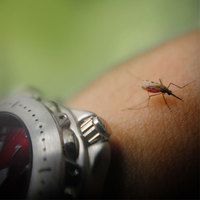
Scientists at the University of Notre Dame have found that exposure to just 10 minutes of light at night suppresses biting and manipulates flight behavior in the Anopheles gambiae mosquito, the major vector for transmission of malaria in Africa, according to new research published in the journal Parasites and Vectors.
Xin Lu wins 2017 Indiana CTSI Young Investigator Award

Dr. Xin Lu, the John M. and Mary Jo Boler Assistant Professor of Biological Sciences, in the Boler-Parseghian Center for Rare and Neglected Diseases, has been awarded a Young Investigator Award from the Indiana Clinical and Translational Sciences Institute (CTSI).
Students receive Fulbright Awards for 2017-2018

Four students from the Department of Biological Sciences have been awarded grants by the Fulbright U.S. Student Program to study abroad in 2017-18.
Biological Sciences faculty win awards for teaching and advising

David J. Veselik, director of undergraduate studies and associate teaching professor in the department of biological sciences, was one of three recipients of the Dockweiler Awards for the 2016–2017 academic year. Veselik is the coordinator for the cell biology laboratory, as well as the biology club advisor. He has taught upper level cell biology labs and lectures. With his guidance, students have participated in several initiatives, including networking with the career center, vertical peer mentoring, lab shadowing and alumni mentoring.
Notre Dame Grad Student Chosen to Present Work at 2017 Future Fellow Research Conference
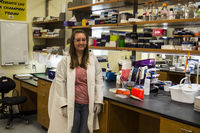
Alyssa Lesko, fourth-year Biology graduate student, was recently selected to present her work at the 2017 Future Fellow Research Conference (FFRC) at St. Jude Children’s Research Hospital in Memphis, Tennessee. Lesko will present her work on how the loss of tumor suppressor Adenomatous Polyposis Coli (APC) and subsequently how its normal functions leads to tumorigenesis. Read more.
Scientists Reveal New and Improved Genome Sequence of Daphnia Pulex
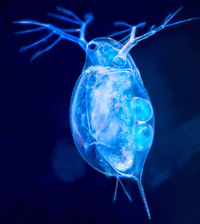
By understanding how they respond to toxic elements, scientists can look at how environmental changes caused by agriculture and road runoff or warming temperatures and climate change could impact populations in lakes, rivers and standing bodies of water.
Notre Dame researcher receives grant to study spinal cord injuries

The Indiana State Department of Health and the Indiana Clinical and Translational Sciences Institute (CTSI) has awarded Cody J. Smith, the Elizabeth and Michael Gallagher Assistant Professor of Biological Sciences and affiliated member of the Center for Stem Cells and Regenerative Medicine, a Spinal Cord and Brain Injury Research Fund (SCBIRF) grant.
Funding scientific research fuels job creation

The University of Notre Dame is highlighted in a new report on the importance of scientific research to economic growth. The study, which was conducted by The Science Coalition, identifies more than 100 companies that exist due to funding received by academic researchers from federal government agencies, including the Department of Agriculture, Department of Energy, National Institutes of Health, National Institute of Standards and Technology, and National Science Foundation.
Biological Sciences Students and Alumni win Prestigious NSF Graduate Research Fellowship Awards

The National Science Foundation (NSF) recently announced the winners of the 2017 Graduate Research Fellowship Program (GRFP), with 15 current Notre Dame students, affiliates and alumni winning the prestigious award and another 18 earning honorable mention. Overall, 11 students in the Department of Biological Sciences were recognized by the NSF.
Kasturi Haldar wins 2017 Ganey Award for community-based research
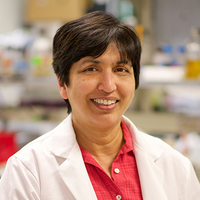
Professor Kasturi Haldar has received the 2016 Rodney F. Ganey, Ph.D., Community-Based Research Award for a project that has helped improve rare disease recognition and treatment in northern Indiana. The award is a $5,000 prize presented annually to a regular faculty member at the University of Notre Dame who has completed at least one research project that addresses a need within South Bend or the surrounding area. Haldar is a molecular cell biologist and the Rev. Julius Nieuwland Professor of Biological Sciences and Parsons-Quinn director of the Boler-Parseghian Center for Rare and Neglected Diseases at the University of Notre Dame.
Researchers develop predictive model measuring nitrous oxide emissions in streams and rivers
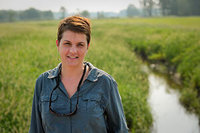
Jennifer Tank, Galla Professor in the Department of Biological Sciences co-authored new research published in the journal Proceedings of the National Academy of Sciences.
Notre Dame Professor Siyuan Zhang wins CTSI grant

Siyuan Zhang, Nancy Dee Assistant Professor of Cancer Research, Assistant Professor of Biological Sciences and affiliated member of Harper Cancer Research Institute at the University of Notre Dame, recently won a grant from the Indiana Clinical and Translational Sciences Institute (CTSI). Awarded Pilot Funding for Research Use of Core Facilities, Zhang is planning on using his funding to learn more about brain metastasis in cancer patients. The award was designed to promote the use of technologies and knowledge made available by Indiana CTSI-designed cores available at partner institutions.
Tuberculosis Research Sheds Light on Disease-related Protein
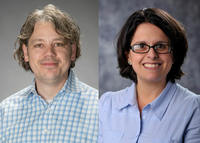
The WHO names Tuberculosis (TB) as one of the top 10 causes of death worldwide and over 95 percent of those deaths occur in low- and middle-income countries. To improve the global health community’s understanding of TB and provide information that could help treat it, Notre Dame researchers have developed a new strain of the bacteria along with a new method to better study this deadly disease.
Tuberculosis: The Disease of Antiquity

Jeff Schorey, a world-renowned expert with pioneering work on the role of exosomes in infectious diseases, has been studying mycobacterial disease for almost two decades.
Finalists named in hotly contested Shaheen 3MT® science qualifying round

The College of Science Shaheen 3MT competition began with a big bang on Monday in Jordan Hall of Science. Julia Beck (Biochemistry), Elizabeth Loughran (Integrated Biomedical Sciences), and Stefan Freed (Biological Sciences) took the top three spots, and will go on to compete at the Shaheen 3MT® Final event on March 23.
Notre Dame biologist Cody Smith wins prestigious Sloan Research Fellowship
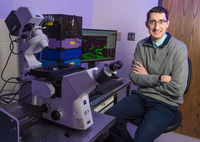
Cody J. Smith, the Elizabeth and Michael Gallagher Assistant Professor of Neural Development and Regeneration, has been selected as a 2017 recipient of the prestigious Sloan Research Fellowship.
How Wolves are Helping Nature Thrive

New Notre Dame research has shown that wolves living in Michigan’s Upper Peninsula are actually helping foxes, hares, and plants survive.
Senior John Huber awarded Gates Cambridge scholarship

This prestigious postgraduate scholarship program, which fully funds postgraduate study and research in any subject at the University of Cambridge, was established through a $210 million donation to the University of Cambridge from the Bill and Melinda Gates Foundation in 2000; this remains the largest single donation to a U.K. university.
Alex Perkins named Early Career Fellow by the Ecological Society of America

The University of Notre Dame’s Alex Perkins, Eck Family Assistant Professor, and member of the Department of Biological Sciences, the Department of Applied and Computational Mathematics and Statistics, the Eck Institute for Global Health, and the Environmental Change Initiative, was named a 2017 Early Career Fellow by the Ecological Society of America (ESA).